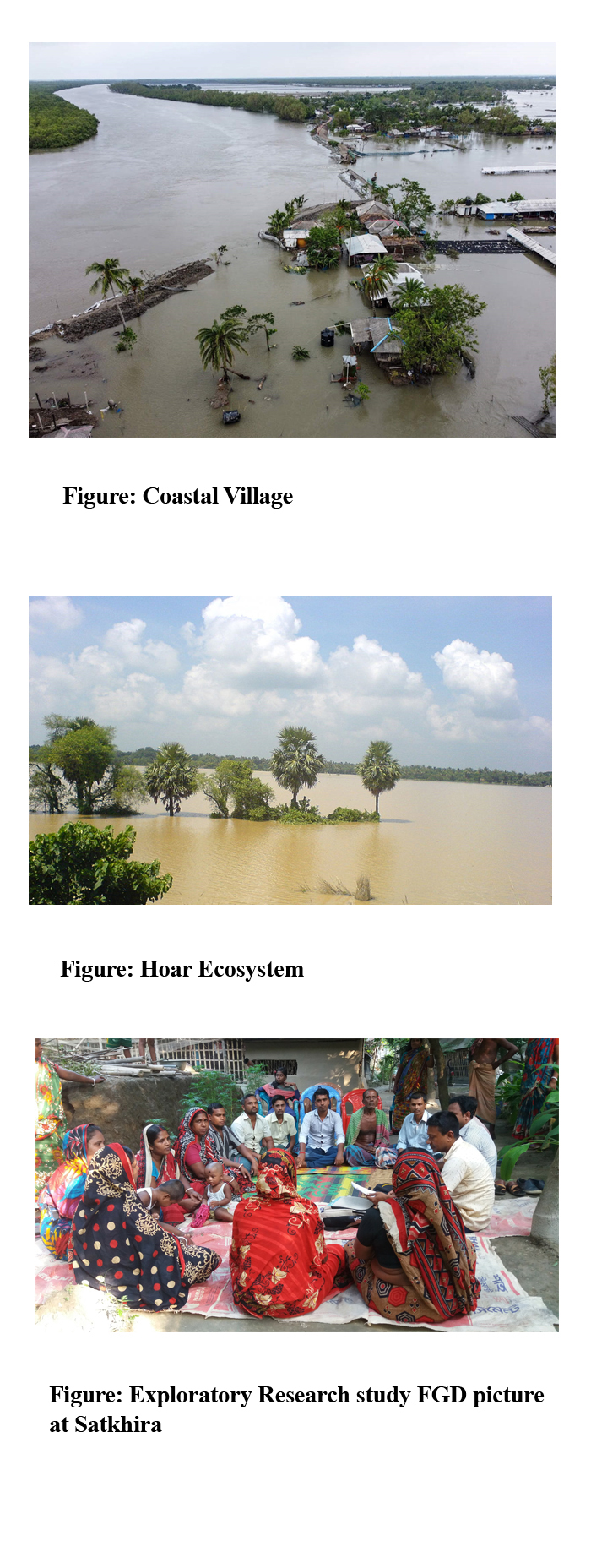
Exploratory Research: Approach and Topics of the Students
One of the milestones of SAKTEE project was to conduct exploratory studies in both coastal communities in Satkhira district and in the wetland areas in Sunamganj district.
• What is Exploratory Research?
Exploratory research is defined as a research used to investigate a problem which is not clearly defined. It is conducted to have a better understanding of the existing problem, but will not provide conclusive results
• Exploratory Research in SAKTEE:
The exploratory research component in SAKTEE is applying the participatory research tools for engaging community people in the disaster-prone villages, socially disadvantaged groups, women and girls. The overarching objectives are to improve our understanding of the climate and social factors of risks and vulnerabilities as well as the gender drivers and social inclusion issues in relation to climate change adaptation and Disaster Risk Reduction.
The University of Manitoba, Canada and the ICCCAD are taking lead in conducting exploratory research. The activities associated with this milestone are: a) selection of students and topics of the studies in alignment with the project goal and objectives; b) using a feminist approach to research, developing methodologies and tools for data collection and analysis; and c) train students to provide the required orientation to the students and field researchers.
• Topics of the students:
The University of Manitoba is preparing methods and tools for exploratory study. Prof. Emdad Haque and his team is taking lead in exploratory research while BCAS will provide local supports and take part in the exploratory research, which has been the second important milestone of SAKTEE Project. Commencing in Year-2, the Exploratory Research component will be carried out under 6 University-based graduate thesis research in Bangladesh (4 thesis) and (2 thesis) in Canada. The distribution of the Thesis topics will be as follows:
• 2 thesis at universities in Bangladesh on the processes that aggravate differentiated impacts on i)women, and ii) socioeconomically poor in coastal communities (Sathkhira district)
• 2 thesis at universities in Bangladesh on the processes that aggravate differentiated impacts on i) women, and ii) socioeconomically poor in the wetland communities (Sunamganj district)
• 2 thesis at the University of Manitoba, Canada on i) disaster and climate impacts on household economies, and recovery and resilience attributes, and ii) the scope and challenges in scaling climate change adaptation technologies in coastal Bangladesh. Although the methodology and sample size of each thesis will differ in accordance with the scoping, discipline and institutional requirements for graduate theses. The common methodology and aggregate sample size of the overall Exploratory Research will attain the following parameters:
• a) Exploratory Research by 4 Thesis in Bangladesh Universities on Women and Disadvantaged Sub-Populations
Sample size : 1200 units primary sampling and 70 KIIs
Sampling procedure: Multi-stage sampling procedure with questionnaire surveys and Key informant interviews
Target groups: women and local community members from disadvantaged groups
• b) Exploratory Study on Disaster and Climate Impacts on Household Economies, and Recovery and Resilience Attributes – a collaboration between BCAS and an UoM graduate student thesis.
Sample size : 1200 disaster affected households, 30 KIIs and 8 FGDs (12-15 participants)
Sampling procedure:Multi-stage sampling procedure with questionnaire surveys and Key informant interviews
Target groups: People from disaster-affected households
• c) Exploratory Study on the Scope and Challenges in Scaling Climate Change Adaptation Technologies in Coastal Bangladesh– an UM graduate student thesis.
Sample size : 30 KIIs and 5 FGDs with 12-15 participants
Sampling procedure:Multi-stage sampling procedure with questionnaire surveys and Key informant interviews
Target groups: local level farmers and water-users, local and regional governmental personnel, and national level policy and decision makers
Distribution of the Exploratory Research Studies with the Thematic Areas of Student Thesis:
Thematic Areas and Social Categories |
Geographical Areas, MS Students and the Universities |
|
Satkhira – Coastal Ecosystem |
Sunamganj- Haor/Wetland |
|
Differentiated Vulnerability of the Women: 600 hhs |
Ms. Alvira Ria, a Bangladeshi student of North South University, presently a student of the University of Manitoba, Canada under the guidance & supervision of Prof. Emdad Haque |
Md. Kazi. Rokonuzzaman a student of the Department of Disaster Resilience and Engineering at Patuakhali Science and Technology University: Supported by ICCCAD-SAKTEE |
Socially disadvantaged and impoverished group: 600 hhs |
Ms. Asma Ul Husna, a Masters Student of the Urban and Rural Planning Discipline, Khulna University: Supported by ICCCAD-SAKTEE |
Mr. Sabbir, a student of MBS Jahangirnagar University under the supervision of Prof. Sharmind Neelormi: BCAS-SAKTEE may look into Climate vulnerability induced forced migration as an adaptation strategy |
Impact of Climate Change-induced stresses and disasters (shocks) on socioeconomic class/groups, recovery and resilience |
Mr. Sabbir Ahmed Khan, a student of the Bangladesh University of Professionals (BUP) will pursue MS thesis under the supervision of Prof. Emdad Haque, University of Manitoba, Canada |
|
Disaster affected hhs: 600 hhs with male and female respondents + 50 women headed hhs |
Mr. Shehab, a student of the University of Asia and Pacific will pursue MS thesis on a) Climate Resilient Technologies in Water, and |
AKM Azad, a Ph.D. student of the Department of Disaster Management, University of Dhaka may look into a) Technologies in Agriculture in Wetland social-ecological systems; and |
Scaling up CCAT: Potentials and Challenges in two ecosystems |
||





